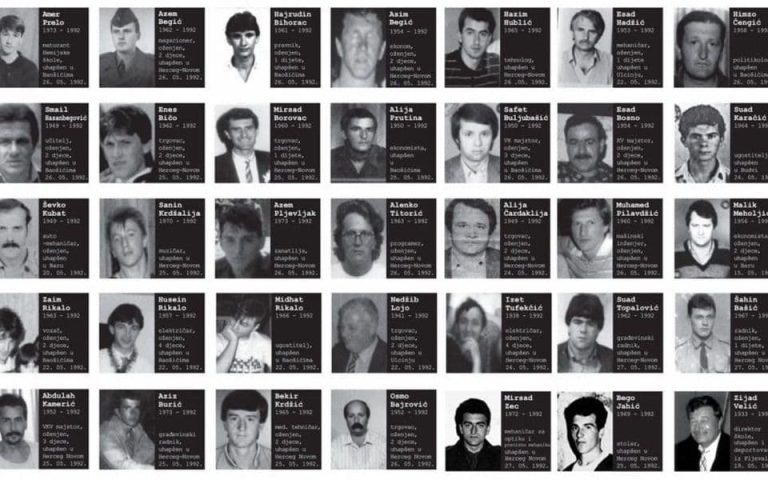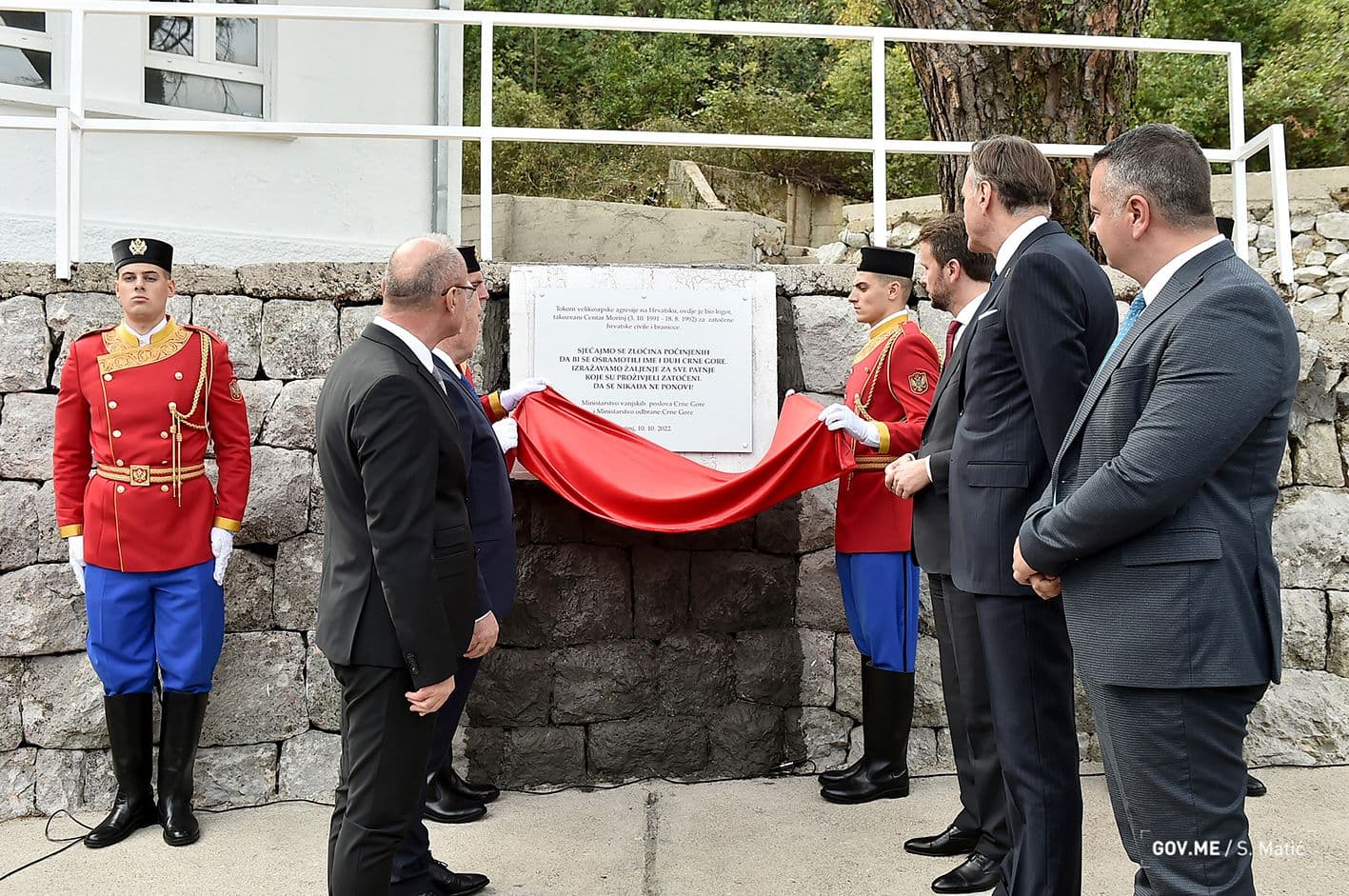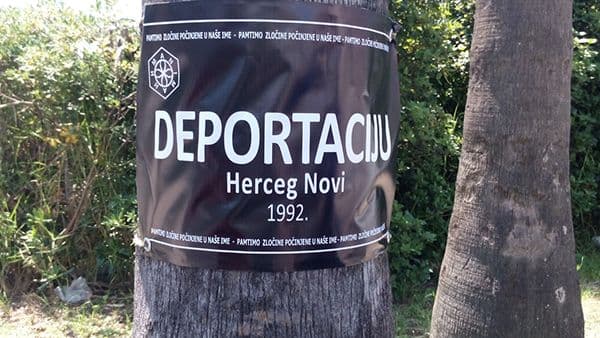
THE SPEAKER OF PARLIAMENT MUST URGENTLY EXPLAIN THE REASONS FOR ANNULMENT OF THE PUBLIC CALL FOR THE APPOINTMENT OF TWO MEMBERS OF THE COUNCIL FOR AUDIOVISUAL MEDIA SERVICES
27/01/2025
OMBUDSMAN TO INVESTIGATE THE SELECTION OF INSIGNIA ON THE SPECIAL POLICE UNIT UNIFORMS
12/02/2025POBJEDA PORTAL: WAR CRIMES IN MONTENEGRO BROUGHT BACK TO LIGHT

Tea Gorjanc Prelević told Pobjeda that this represents a significant step forward, as the same obligation was outlined in the strategy of former Supreme State Prosecutor Ivica Stanković as early as 2015, but there was no political will to take any action. She emphasized that she hopes all the undertaken measures will lead to results while witnesses, the closest relatives of the victims, and unpunished perpetrators are still alive. We present the full text from Pobjeda:
War crimes committed in Morinj, Bukovica, Kaluđerski Laz, and the Deportation of Refugees from Herceg Novihave been reopened by the Special State Prosecutor’s Office.
Chief Special Prosecutor Vladimir Novović has ordered the re-establishment of case files on these incidents to finally bring them to a judicial conclusion.
“In the newly formed cases, special investigative teams have been established in accordance with the Law on the Special State Prosecutor’s Office. These teams will, among other tasks, analyze previously closed criminal cases related to the same events, in which legal proceedings had been concluded, with the obligation to gather new evidence and conduct searches in the database of the International Residual Mechanism for Criminal Tribunals,” the Special State Prosecutor’s Office stated.

They further explained that the cases have been assigned to Special State Prosecutors who, according to the annual work schedule, specialize in prosecuting war crimes.
As stated, Chief Special State Prosecutor Vladimir Novović developed action plans related to war crime cases before reopening the criminal proceedings. These plans cover both cases that are still in the investigative or prosecutorial phase, as well as incidents that were previously subject to completed war crime trials. The plans outline measures and activities that the Special State Prosecutors will undertake to issue prosecutorial decisions as swiftly as possible and assess the legal options for further proceedings based on available and potentially new evidence.
“By adopting these action plans, which were developed with the participation of a working groupestablished and led by the Chief Special State Prosecutor, the Special State Prosecutors have begun fulfilling their obligations in line with the 2024–2027 War Crimes Investigation Strategy and the accompanying Action Plan for 2024–2025,” the Special State Prosecutors announced yesterday.
The War Crimes Investigation Strategy was adopted in September last year and was developed with the support of the United Nations Development Programme (UNDP), covering the period until 2027. At the same time, the Action Plan for 2024 was also adopted.
Hope for Justice
Tea Gorjanc-Prelević, Executive Director of the Human Rights Action (HRA), told Pobjeda that the organization welcomes the steps taken by the Chief Special State Prosecutor regarding the reopening of criminal cases related to the crimes in Morinj, Bukovica, the Deportation of Refugees, and Kaluđerski Laz.

“This demonstrates that the new 2024–2027 War Crimes Investigation Strategy and its accompanying Action Plan are being implemented. These documents mandate the reopening of old cases that were not adequately prosecuted, as well as greater transparency of the Special State Prosecutors in handling war crimes cases,” she said.
A Long-Awaited Step
Tea Gorjanc-Prelević emphasized that this marks a significant step forward, as the same obligation was outlined in the 2015 War Crimes Investigation Strategy introduced by former Chief Special State Prosecutor Ivica Stanković, but there was no political will to take action.
“We hope that these efforts will yield results while witnesses, the closest relatives of the victims, and unpunished perpetrators are still alive. This would be of great importance not only for the families of the victims but also for the rule of law and the restoration of trust in the judiciary in Montenegro,” said Gorjanc-Prelević.
Decades of Silence
During the presentation of the new War Crimes Investigation Strategy, Supreme State Prosecutor Milorad Marković stated that confronting the past and strengthening the rule of law require the State Prosecutor’s Office to improve its procedures and intensify efforts to clarify war crimes cases.
Chief Special State Prosecutor Vladimir Novović previously stated that the Special State Prosecutors will ensure the Strategy is implemented in a way that enhances war crimes investigations and leads to concrete results.
One of the final benchmarks in Chapter 23 of Montenegro’s EU accession process relates to the country’s approach to war crimes prosecution.
In May 2015, former Chief Special State Prosecutor Ivica Stanković introduced a War Crimes Investigation Strategy, committing the Supreme State Prosecutor’s Office to combat impunity more effectively by improving investigations, prosecutions, trials, and sentencing in line with international standards. However, in the years since, Montenegrin authorities have failed to use available mechanisms to fully investigate the war crimes committed during the conflicts of the 1990s.
In the 26 years since the wars in the former Yugoslavia, Montenegro has secured final convictions for only 11 individuals, less than a third of those indicted. In three cases (Bukovica, Deportation, Kaluđerski Laz), the indictments were dismissed, as all the accused were acquitted—even though the existence of victims in these crimes is undisputed, and they deserve justice. In the Klapuh case, of the five convicted individuals, only one served a sentence.
Meanwhile, Montenegrin authorities have not conducted thorough investigations into war crimes committed in the Dubrovnik battlefield or the actions of so-called “weekend warriors,” despite explicit recommendations from European Commission expert Maurizio Salustro in 2014.
Kaluđerski Laz
In Kaluđerski Laz, near Rožaje, members of the Army of the Federal Republic of Yugoslavia killed a total of 22 and wounded seven Albanian civilians in 1999. These civilians had fled war-torn Kosovo to seek refuge in Montenegro during the NATO intervention. Among the victims were children, women, and the elderly.
For years, the Human Rights Action (HRA) has pointed out that no one has been held accountable for this crime due to a poorly conducted investigation. The High Court in Bijelo Polje was unable to identify which soldiers fired at the civilians or who gave the order, leading to the acquittal of all the accused in 2013 due to a lack of evidence. The Court of Appeals later upheld this verdict.

Morinj: A Point of Dispute
A war crime was committed in Morinj, as confirmed by the final criminal verdict of the Higher Court in Podgorica, which established that war crimes against prisoners of war, in the form of physical abuse, were carried out at the JNA detention center in Morinje. Four individuals were sentenced to prison terms for this: Ivo Gojnić to two years, Boro Gligić to three years, Špiro Lučić to three years, and Ivo Menzalin to four years.
In October 2022, a memorial plaque was installed in Morinje, which caused discontent among parts of the public and locals, and municipal inspections attempted to remove it. However, the plaque is on a building guarded by the Montenegrin Army, so its removal has not occurred.
Bukovica in the Darkness of Justice
In Bukovica, between 1992 and 1995, according to available data, six people were killed, two committed suicide due to torture, 11 were abducted, 70 were tortured, and around 270 were expelled.
This occurred during the armed conflict in Bosnia and Herzegovina, when a large number of reservists from the Yugoslav Army, members of paramilitary formations, and the police of Montenegro were stationed in the area of Pljevlja. To this day, no one has been convicted for these crimes in Montenegro. The perpetrators and their instigators have not been identified.
In an analysis by the Human Rights Action (HRA), which thoroughly examined this war crime, it is noted that the request to initiate an investigation into the crimes committed in Bukovica was submitted by the Higher State Prosecutor to the Higher Court in Bijelo Polje on December 11, 2007. The investigation was immediately classified as a state secret. The investigation involved seven former members of the reserve police and the reserve Yugoslav Army. An indictment for war crimes against humanity was raised on April 21, 2010, against brothers Radmilo and Radiša Đuković, Slobodan Cvetković, Milorad Brković, and Đorđije Gogić, all members of the reserve Yugoslav Army, as well as Slaviša Svrkota and Radoman Šubarić, members of the reserve Ministry of Interior of Montenegro. According to the HRA’s investigation, the accused were charged with abusing the Muslim population, causing them severe suffering, endangering their health and bodily integrity, applying measures of intimidation, and thus creating a psychological atmosphere for forced displacement.
It was also highlighted that particular attention was paid to the testimony of the Director of the Police Administration, Veselin Veljović, who, during the period covered by the indictment, was the commander of the Police Station in Pljevlja and, according to some testimonies, led the house searches in Bukovica.
The court ruled that there was no evidence to support the claims in the indictment. In 2011, the panel of the Higher Court in Bijelo Polje issued a verdict acquitting the accused. Contrary to the allegations in the indictment, the court determined that the members of the Muslim nationality from the Bukovica area did not leave due to inhuman treatment by the accused but voluntarily, and that both Serbs and Montenegrins also left the area. The Supreme State Prosecutor filed a request for the protection of legality with the Supreme Court against the final verdict of the Appellate Court. On January 21, 2013, the Supreme Court rejected this request as unfounded.

Searching for Salvation, Delivered to Death
In May 1992, the Montenegrin police deported Bosnian refugees and handed them over to the Army of the Republika Srpska, which was then under the leadership of Radovan Karadžić. The majority of them were executed, while 12 refugees survived the torture in concentration camps. Among them were also refugees of Serbian ethnicity, who were sent back to be mobilized.
According to available official documents, in May and June 1992, the Montenegrin police unlawfully arrested at least 66 Muslims from Bosnia and Herzegovina, who had fled to Montenegro to escape the war in Bosnia, and then handed them over to the enemy forces of the Bosnian Serb Army, who executed most of them. Additionally, 33 refugees of Serbian ethnicity from Bosnia and Herzegovina were arrested. Unlike the Muslim refugees, the deported Serbian refugees were not treated as hostages, nor is it known if any of them died as a direct result of their deportation.
The majority of the arrested refugees were taken to the Herceg Novi Security Center, which served as an assembly point, from where they were organized and transported by bus on May 25 to the KPD Foča concentration camp, and on May 27 to an undisclosed location in eastern Bosnia, in the territory of the then Republika Srpska.
The then Minister of the Interior of Montenegro, Pavle Bulatović, issued a written order, at the request of the Ministry of the Interior of the Republika Srpska, based on which Bosnian refugees were arrested across Montenegro. They were then handed over to the forces of Ratko Mladić and Radovan Karadžić.
The deportation, one of the shameful chapters of Montenegrin history, did not deserve to be commemorated with a plaque or a memorial, an issue that non-governmental organizations such as HRA, CGO, and ANIMA have been pointing out for more than 15 years. These organizations also mark this crime every year, demanding accountability, and ensuring that neither this nor any other crimes, for which responsibility has now been taken over by the Special State Prosecutor’s Office , are forgotten.





 English
English